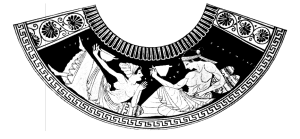There is a reason why the Ancient Greeks are portrayed in history as a bunch of wine drunkards, because they were. A famous quote by Greek philosopher and historian Thucydides around the 5th century BCE states, “The peoples of the Mediterranean began to emerge from barbarism when they learned to cultivate the olive and the vine.” The Ancient game of Kottabos was a drinking game played by Greek elites beginning in the 4th and 5th centuries BCE and consisted of throwing wine lees at cups or statues as a test of coordination and dexterity. The game is basically the Ancient Greek version of beer pong, which similarly is played as a test of coordination.
I found this article, From Kottabos to War In Aristophanes’ Acharnians by Ross Scaife particularly interesting. The Acharnians is the third play by Greek playwright Aristophanes, written around 425 BCE, and as discussed in the article features a scene in which a couple of young Athenians who were drunk from playing Kottabos, stole a whore from Megara –a town in West Greece. The outraged Megarans then stole two whores from the brothel of Aspasia –an influential Athenian immigrant–, which created a “tit-for-tat” quarrel that lead to the beginning of the Peloponnesian War. The article goes on to discuss how the game of Kottabos is portrayed throughout Ancient Greek literature as “aphrodesiatic” and a lust educing activity, however unlike in The Archinians, is typically not associated with the outbreak of war.
Scaife goes on to discuss the Greek Philosopher Plutarch’s view on how Kottabos reflects Greek social culture. Plutarch’s view is that the game of Kottabos is used as a resemblance of both the playfulness and seriousness of the Greek men who played the game. Because Kottabos was a game often played by Greek elites, it is not uncommon to find the game a reflection of social status and more serious in nature rather than playful. While this is true, much of the Greek writing that refers to the game also adds a sense of playfulness as discussed by Plutarch in his writings.
While the game is referenced in literary work, it is also referenced in the writings of Philosophers like Plato. Both Plato and Plutarch wrote of how ridiculous the game was, and how it was a reflection of the basic stupidity of the men who played the game. The author of the article notes, “he [Plutarch] considered kottabos too ridiculous to be worthy of inclusion in any respectable symposium [drinking party] (10.)” Plato additionally considered the game to be ridiculous.
I think what I drew most from the article was the similarity between kottabos drinking games that are played today. In American society today, drinking games are most frequently associated with young adults. I think it is safe to say that everyone would find it a little bit odd if the United States Congress started playing beer pong during Committee Sessions, or if the average American parent even knew what the games’ Categories or Flip Cup were. While drinking games such as Kottabos were incidentily played by political and social elites, they were also looked down upon and referenced as ridiculous and immature by many Greek philosophers. Even though the game was played by political elites, It was still looked down upon as it is today.

